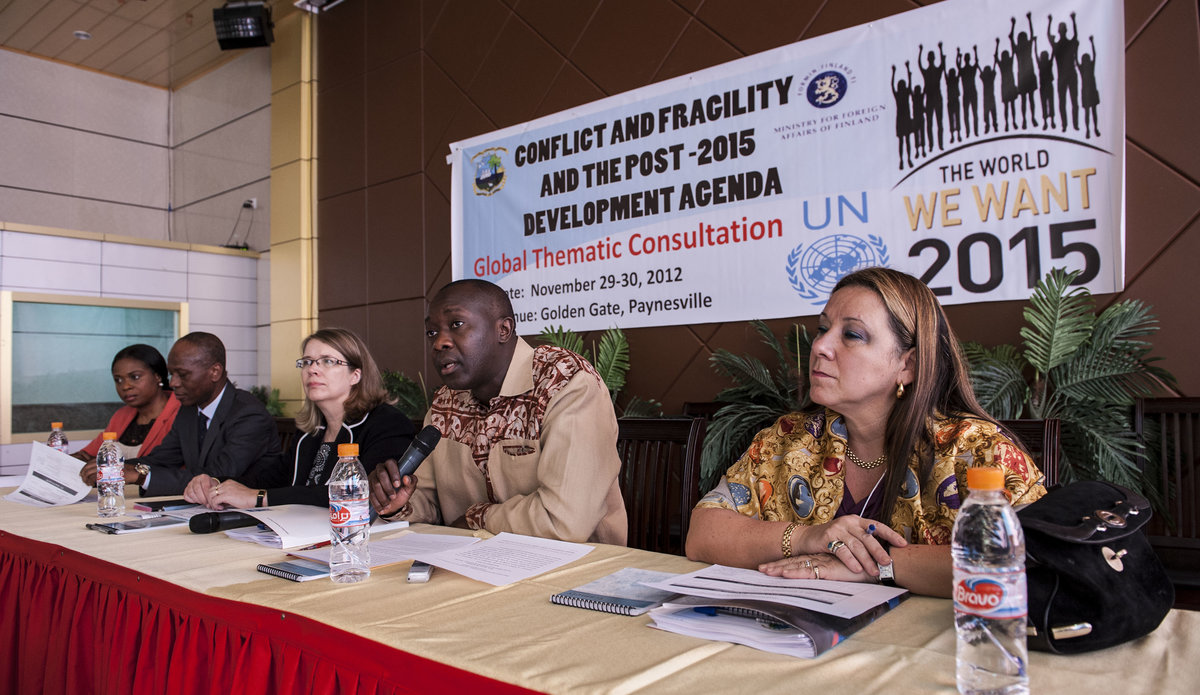Liberia: Peace and stability hold key to future development vision
Monrovia, Liberia, 29 November 2012 - The global burden of disasters and armed violence which affect over 200 million people and result in over 500,000 deaths each year will be the focus of a forum on conflict and fragility which opens in Liberia tomorrow.
With a special focus on Africa, the forum is co-hosted by the governments of Liberia and Finland, and involves participants from a vast array of public and private organizations, including government, civil society, media, trade unions, youth representatives and traditional leaders.
Conflict, violence and disasters are widely recognized as significant obstacles to achieving the Millennium Development Goals (MDGs) in many developing countries.
This week's gathering is the latest in a series of three United Nations-led thematic consultations calling for input from a wide cross-section of society on how issues concerning disasters, conflict and citizen security can be integrated into a new universal development framework.
"Violent conflict is a reality for far too many people across the world," the Assistant Secretary-General for Peacebuilding Support, Judy Cheng-Hopkins, said. "These consultations are a unique opportunity to put this reality in front of world leaders through an inclusive, participatory process."
Since 2000, disasters have affected 2.7 billion people resulting in $1.3 trillion in economic losses and 1.1 million deaths. An estimated 526,000 people die violently every year including 55,000 who lose their lives in conflicts.
UNISDR, the UN Office for Disaster Risk Reduction, says that 75% of the top 40 recipients of humanitarian aid - including 11 African countries - are still experiencing conflict or have recently emerged from conflict, and all are vulnerable to a range of natural hazards, particularly floods.
UNISDR Chief Margareta Wahlström said: "Countries recovering from, or still experiencing, conflict are also exposed to natural hazards. They receive 90% of all humanitarian aid but only 1% of the development aid they receive is for disaster risk reduction. This shows we have not yet understood the links between conflict and fragility when it comes to investing in resilience in countries faced with the effects of disasters and conflict."
The two-day event in Monrovia is expected to explore possible goals, targets and indicators that will help strengthen a global coalition of partners to advocate for a deeper understanding of the impact of conflict, violence and fragility in the post-2015 development agenda. '
"The Monrovia consultation presents an important opportunity to consider how to ensure that issues of peace and security are embedded within the post 2015 development framework," the Assistant Administrator and Director of UNDP's Bureau for Crisis Prevention and Recovery, Jordan Ryan, said. "For development to be sustainable, it needs not only to build peace but also address armed conflict, fragility, and organized violence.
The combined input from the thematic consultation will feed into the Secretary-General's High-level Panel on Post-2015 which is due to submit a report presenting a bold yet practical global development vision to the Secretary-General in May 2013.
President Ellen Johnson Sirleaf of Liberia is a co-chair of the High-level Panel alongside Prime Minister David Cameron of Britain and President Susilo Bambang Yudhoyono of Indonesia.
President Johnson Sirleaf and Finland's Under Secretary of State for Development Cooperation and Development Policy, Anne Sipiläinen, will be among the participants at the Monrovia event.
The results of the consultations will be available online at: www.worldwewant2015.org.
Media contacts
Miraj Pradhan UNICEF Liberia, mpradhan@unicef.org, + 231 (0)770 267 110
Henk-Jan Brinkman Chief, PPA Branch, PBSO, brinkman@un.org, Tel: +1 212 963 0936
Julie Marks UNDP News, julie.marks@undp.org, Tel: +1 212 906 5358
Denis McClean Head, UNISDR Communications, mccleand@un.org, Mob: +41 79 444 5262
NOTE TO EDITORS
Since they were adopted by all UN Member States in 2000, the Millennium Development Goals (MDGs) have helped to set global and national priorities and prompt action on the ground. Even if the MDGs are fully achieved by 2015, continuing gaps - on poverty, hunger, health, gender equality, water, sanitation and many other issues - will still need attention.
Global consultations on 11 themes - including governance, inequalities, health, education, and conflict and fragility - are part of an unprecedented open and inclusive process to seek input into the world's future development framework.
Thematic consultations are being complemented by national dialogues with governments, civil society, academia and other groups under way in more than 50 countries, including 19 in Africa.
The conflict and fragility theme is led by the UN Fund for Children (UNICEF), the UN Peacebuilding Support Office (PBSO), the UN Office for Disaster Risk Reduction (UNISDR) and the UN Development Programme (UNDP), supported by the Government of Finland.
The first consultation for this theme focused on disasters and reducing disaster risk and was held in Jakarta, Indonesia, last month in the margins of the 5th Asian Ministerial Conference on Disaster Risk Reduction.
A third forum will take place in Panama in January 2013 focusing on citizen security, armed violence and its impact on development.
These regional consultations will culminate in a High-Level Consultation in Helsinki in February 2013, to be hosted by the Government of Finland, at which the outcomes of the various elements will be debated and consolidated into a synthesis report.
In addition to informing the work of the High-level Panel, this report will be also be an input to the Secretary-General's report, where he will present his vision for the post-2015 development framework, to be considered by Member States in New York in September 2013.
A 12-member international Expert Reference Group on the impact of conflict, violence and disaster on development post-2015 is also offering critical thinking during these consultations.
See also: www.worldwewant2015.org.
 UN
UN United Nations Peacekeeping
United Nations Peacekeeping





